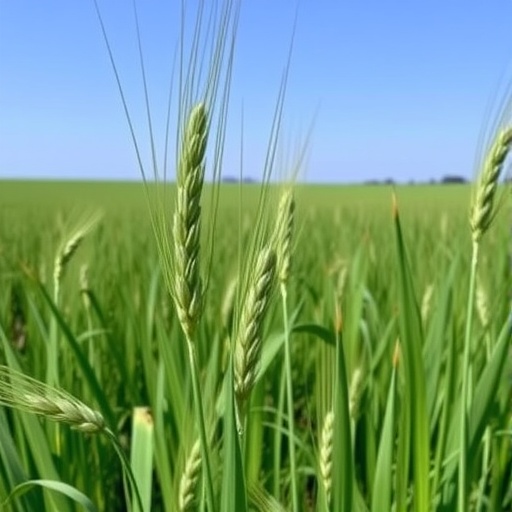In a groundbreaking study set to reshape our understanding of plant genetics, a team of distinguished researchers, including Zheng, Z., Chen, Q., and Yan, Y., present a comprehensive exploration of chloroplast genomes in the context of cytoplasmic male sterility (CMS). Their systematic investigation reveals the intricate evolutionary relationships between the chloroplast genomes of wheat and its maintainer line, particularly focusing on the enigmatic cytoplasm derived from Aegilops ovata. This work, poised for publication in BMC Genomics in 2025, leverages advanced genomic techniques to unveil the hidden complexities of plant reproductive biology.
The significance of understanding chloroplast genomes cannot be overstated, especially in crops where CMS plays a pivotal role in hybrid seed production. Aegilops ovata, a species known for its unique cytoplasmic characteristics, offers an invaluable perspective on the molecular underpinnings of CMS. By comparing the chloroplast genomes from Aegilops ovata and the maintainer line of wheat, Zheng and colleagues illuminate potential pathways that regulate fertility and seed production in these essential crops.
Chloroplast genomes are critical to plant metabolism, photosynthesis, and overall vigor. Their circular structure and relatively high mutation rates make them key targets for evolutionary studies. The research team’s application of phylogenetic analysis enhances our understanding of the evolutionary trajectories of these genomes, shedding light on how they have adapted to various environmental pressures over eons. This comparative approach not only enriches our genetic libraries but also opens new avenues for improving crop resilience and yield.
Utilizing cutting-edge sequencing technologies, the researchers were able to construct high-resolution chloroplast genome maps. These maps provide a treasure trove of data, allowing scientists to pinpoint the genetic variations that contribute directly to CMS phenomena. Through meticulous analysis, they identified specific loci responsible for male sterility, offering the first clear genetic evidence of CMS mechanisms linked to the Aegilops ovata cytoplasm.
One of the standout findings from the study is the identification of several conserved sequences within the chloroplast genomes, which correlate with the expression of genes involved in reproductive development. This link not only points toward the evolutionary significance of these genomes but also suggests a complex interplay between nuclear and cytoplasmic genes that governs fertility in wheat. By understanding these relationships, plant breeders could potentially manipulate genetic traits to enhance hybrid vigor without sacrificing desired agronomic characteristics.
Moreover, the phylogenetic trees generated from the study reveal significant insights into the evolutionary lineage of CMS in wheat. The data underscore the close nexus between Aegilops ovata and cultivated wheat varieties, illustrating how ancient genetic exchanges have shaped modern agricultural practices. This connection between wild and domesticated species amplifies the importance of conserving genetic diversity within crop plants, which is vital for future food security.
The implications of this research extend beyond academic interest; they are critically relevant to agricultural innovation. As climate change and global food demands escalate, the breeding of resilient and high-yield crops is more essential than ever. This study’s findings not only provide a framework for understanding CMS but also equip plant biologists with the knowledge to develop new hybrid varieties that can withstand diverse environmental challenges.
Furthermore, the researchers emphasize the potential for utilizing these genomic insights in crop improvement programs. By strategically employing cytoplasmic genomes from Aegilops ovata, breeders can enhance traits such as disease resistance, drought tolerance, and overall yield. This targeted approach could lead to the creation of hybrid varieties that not only meet the demands of farmers but also ensure sustainable agricultural practices.
One cannot overlook the collaborative effort that this research embodies. It reflects a global momentum in plant genomics aimed at deciphering complex traits through interdisciplinary partnerships. The contributions from bioinformaticians, evolutionary biologists, and plant geneticists underscore the myriad benefits of collaborative science in tackling pressing agricultural issues.
As the study continues to attract attention, the scientific community eagerly anticipates subsequent developments in the field. Future research will likely delve deeper into the functional implications of the chloroplast genome variations identified, exploring how these elements can be harnessed to bolster agricultural productivity in a rapidly changing world.
In conclusion, Zheng, Z., Chen, Q., and Yan, Y. have laid the groundwork for a new era of plant genetic research with their comparative and phylogenetic study of chloroplast genomes in relation to CMS and Aegilops ovata. Their findings promise to illuminate the path forward for scientists and agriculturists alike, fostering innovations that marry traditional plant breeding with modern genomic advances. As we venture further into the complexities of plant genetics, it becomes clear that such studies are not merely academic exercises but crucial steps toward a sustainable agricultural future.
This research embodies the very spirit of innovation and interdisciplinary collaboration, setting a benchmark in the ongoing quest to enhance our understanding of plant genetics. It illustrates the power of genomics as a tool for improving crop species, an essential endeavor as humanity faces the dual challenges of climate change and feeding a growing population. With continuous advancements in genetic technologies, the prospects for agriculture are not only promising but also transformative, heralding a new chapter in our relationship with the natural world.
Subject of Research: Comparative analysis of chloroplast genomes related to cytoplasmic male sterility in wheat.
Article Title: Comparative and phylogenetic study on the chloroplast genomes of CMS with the cytoplasm of Aegilops ovata and its maintainer line in wheat.
Article References:
Zheng, Z., Chen, Q., Yan, Y. et al. Comparative and phylogenetic study on the chloroplast genomes of CMS with the cytoplasm of Aegilops ovata and its maintainer line in wheat.
BMC Genomics (2025). https://doi.org/10.1186/s12864-025-12334-x
Image Credits: AI Generated
DOI:
Keywords: chloroplast genomes, cytoplasmic male sterility, wheat, Aegilops ovata, phylogenetic analysis, plant genetics, crop improvement, hybrid varieties.
Tags: advanced genomic techniques in botanyAegilops ovata cytoplasmic characteristicsBMC Genomics publication on chloroplastschloroplast genome analysis in wheatcytoplasmic male sterility in plantsevolutionary relationships in chloroplast genomeshybrid seed production researchmolecular underpinnings of fertility regulationphylogenetic analysis of chloroplastsplant reproductive biology insightssignificance of chloroplasts in crop metabolismunderstanding plant genetics through chloroplasts





